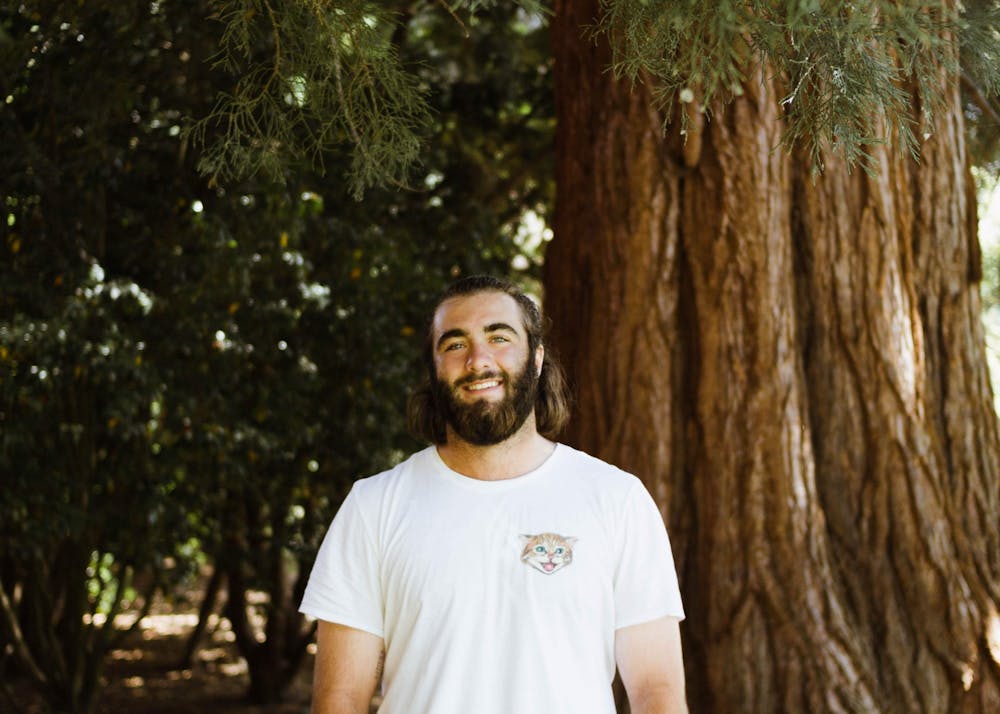Just about 98 years ago to the day, in a small bookshop on the Left Bank of the Seine in Paris, France, a man named James Joyce published a very simple book that would lead many to call it the most complex work of art in recent times. In the Modern Library’s list of the top 100 books of the 20th century, Joyce’s book ranked number one. This book, titled “Ulysses,” cataloged the day in the life of a man named Leopold Bloom living in Ireland on June 16, 1904. Much has been said about this day.
Joyce was a strange yet wondrous little creature, and he did not think his work to be all that serious. In an interview, he once told American writer Djuna Barnes that, “on the honor of a gentleman, there is not one single serious line in it.” Scholars, of course, with all their serious words and gentlemanly honor, would largely disagree. Take a trip down to the book stacks in Clark Library, and you will find north of 30 (extremely serious) books on the matter.
“Ulysses” has become the go-to for people who long to appear intelligent and filled with endless complexity. To bring it up in conversation is equivalent to bringing up your status as a Sommelier; the reference is obtuse enough that nobody can challenge you, but acute enough that people have to shield their eyes from the sun while looking up at you.
Joyce, of course, would have found such charades to be utterly ridiculous, and he got to mocking people like these long before he died. He had a secret written within his work, and it was one that many people did not see then and still do not see now. But I’ll admit — it is quite difficult to see.
“Ulysses” is extremely tough to read. I have wasted away hours upon hours of my life playing a miserable game of tug of war with my copies of it, so let me be clear: This is not a recommendation to go home and read it. I will tell you what you need to know to save you the time that you could undoubtedly spend better elsewhere. Though of course, if you have some sick love of often incomprehensible blabber, then by all means, head right over to Powell’s and pick one up as soon as possible.
To put it simply, “Ulysses” tells the story of Leopold Bloom and his various activities throughout his day in Dublin. Joyce separates the story into 18 chapters, all of which are stylistically unique — one of them is written as a play, one as an internal monologue, one is in a question/answer format, so on and so forth. This accounts for some of the difficulty of the book, as its variations in form often make it elusive and difficult for readers to get used to.
Thankfully though, those parts of the book are unimportant for our purposes here. The one thing that is important, however, is that Joyce based the story’s structure on Homer’s “Odyssey,” the ancient Greek epic poem that tells the story of one of the first literary heroes: Odysseus (“Ulysses” in Latin). The “Odyssey” tells the story of Odysseus’ 10-year fight to return home to Ithaca, a journey in which Odysseus visits many strange lands and battles various gods and mythical creatures. Yet though Joyce’s work is structured on Homer’s, Leopold Bloom is quite unlike Odysseus. Throughout his journey, he does not visit any strange lands or fight any angry gods or goddesses — Bloom doesn’t so much as step foot outside the city of Dublin. So, how then, you might ask, are these two stories even related at all? Good question.
When “Ulysses” was published, it was widely unliked. It was banned in the United States as obscenity, considered pretentious by other writers, worthless to the general public and even frowned upon by his own wife. Yet still, Joyce maintained that “if ‘Ulysses’ isn’t fit to read, then life isn’t fit to live.” He argued that all he had done was record what a human being sees, hears, thinks and feels throughout the course of the day. It's ironic, then, that even though the book was about a very average person going about his very average day, all the very average people who read it thought that it was indecipherable and much too complex. It would seem that if his goal was to hold a mirror up to the people who read it, he had done just that.
Most of us, I’m guessing, will not end up living the kind of lives that are as adventurous as that of Odysseus. Many of us will instead go on to live relatively simple, stable lives among our families and friends, and indeed, we will be made all the better for that. But my words betray me: These journeys are rarely ever simple. They are, as I’m sure Joyce would agree, the only moments in which we find ourselves witness to a complexity that is far beyond any product of the imagination, far beyond any green-screen image on the movie screen, or far beyond any mythical landscape in the pages of a book.
Admittedly, this is a difficult thought to work through. I don’t yet fully believe it for my own part — I am still very much wrestling with it each and every day. But that is the heart of the struggle itself, isn’t it? Perhaps our greatest trial is coming to the realization that our lives are far more richly constructed than these grand stories we see and hear about. Perhaps, I think, our struggle is the task of living with this realization and growing (with boatloads of screw-ups and setbacks, of course) to really, truly, passionately love it.
But it's not all that easy, I understand. Simplicity is a dreadful thing to many people, as ultimately, it means that we have to stare down the ugly parts of our lives and really feel them rather than just averting our eyes and plugging our ears. Many who are scared of such an idea will tell you that you need to stand out, go somewhere, do something big in order to live. They’ll tell you that you need to really be someone, like an actor, a CEO, a politician, a doctor, a lawyer, or whatever the thing is that means you’re Big Business these days. And sure, perhaps that is true for some people. But more often than not, I tend to disagree.
Rather, I find that the more like Leopold Bloom someone thinks they are, the more like Odysseus they accidentally become. So, keep that in mind, and let me tell you about what I consider to be the heftiest, dangerous, Big Business, bizarre, dull, and frankly, poetic journey of all. I’m willing to bet you’ll recognize it.
After all, you live it over and over again seven times a week, 365 times a year. It comes complete with all its wrathful gods and monstrous creatures, all its socks made wet from puddles and tests failed yet again and morning classes missed and hair ruined in the rain and three-hour labs run late and awkward study groups and homesick family phone calls. And it is all very dreary and tiring — I’m with you there.
But somewhere along the wandering, you catch sight of Ithaca, or maybe Portsmouth or Mehling, and indeed, every night, you make it back to your cramped, muggy little room in one broken but single piece. Every night, you, me, the whole lot of us, return to these momentary homes, whatever address we live at, rub our eyes, crawl in between our sheets (which are in desperate need of washing) and prepare to go to war all over again. And I, speaking with the most serious sincerity I can possibly muster up, do not think that I could ever in a million years dream up a more heroic, extraordinarily ordinary adventure.
Ajay Davis is a reporter for The Beacon. He can be reached at davisaj22@up.edu.








